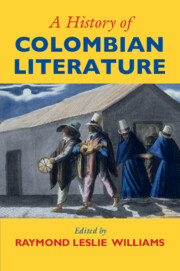Book contents
- Frontmatter
- Contents
- Notes on contributors
- Preface
- Introduction
- PART I LITERATURE AND SOCIETY IN COLOMBIA
- 1 Colonial realities and colonial literature in “Colombia”
- 2 Cosmography, ethnography, and the literary imagination of the New Kingdom of Granada
- 3 Colombian poetry from the colonial period to Modernismo (1500–1920)
- 4 Reflections on the historiography of the Colombian novel: 1844–1953 and beyond
- 5 Modern Colombian poetry: from modernismo to the twenty-first century
- 6 The late twentieth-century Colombian novel (1970–1999)
- 7 Twenty-first century fiction
- 8 Colombian theater: staging the sociopolitical body
- 9 The Colombian essay
- PART II COLOMBIAN CULTURE AND SOCIETY IN REGIONAL CONTEXTS
- PART III BEYOND THE BOUNDARIES
- AFTERWORDS
- Index
- References
6 - The late twentieth-century Colombian novel (1970–1999)
from PART I - LITERATURE AND SOCIETY IN COLOMBIA
Published online by Cambridge University Press: 05 June 2016
- Frontmatter
- Contents
- Notes on contributors
- Preface
- Introduction
- PART I LITERATURE AND SOCIETY IN COLOMBIA
- 1 Colonial realities and colonial literature in “Colombia”
- 2 Cosmography, ethnography, and the literary imagination of the New Kingdom of Granada
- 3 Colombian poetry from the colonial period to Modernismo (1500–1920)
- 4 Reflections on the historiography of the Colombian novel: 1844–1953 and beyond
- 5 Modern Colombian poetry: from modernismo to the twenty-first century
- 6 The late twentieth-century Colombian novel (1970–1999)
- 7 Twenty-first century fiction
- 8 Colombian theater: staging the sociopolitical body
- 9 The Colombian essay
- PART II COLOMBIAN CULTURE AND SOCIETY IN REGIONAL CONTEXTS
- PART III BEYOND THE BOUNDARIES
- AFTERWORDS
- Index
- References
Summary
The late twentieth century was one of the most productive, heterogeneous, and interesting periods in the history of the Colombian novel. Gabriel García Márquez, Alvaro Mutis, Fernando Vallejo, Darío Jaramillo, and others published some of their most compelling works, and the readership of the Colombian novel, for the first time in the nation's history, became truly international. The centerpiece of this public recognition was the awarding of the Nobel Prize for Literature to García Márquez in 1982. Alvaro Mutis, on the other hand, was prominent as both a novelist and a poet, and much of his fiction appeared in English translation.
Colombian society, culture, and literature had been exceptionally regionalist until the mid-1950s, and the Colombian novel tended to follow this pattern. In the mid-1950s, however, Colombia's modernization and breakdown of a regional nation was transforming the country. By the mid-1950s, television broadcasts began in all major cities, and during that same period Antonio Curcio Altamar published his now-classic study Evolución de la novela en Colombia (Evolution of the Novel in Colombia), a book that assumed a national vision for the novel. Similarly, the magazine Mito, rather than regional, was modern in conception and national and international in vision. It published writers from all regions, including the then young and relatively unknown costeño Gabriel García Márquez, and a then young poet named Alvaro Mutis, who later gained international recognition as both a poet and novelist.
In the 1960s, the irreverent nadaístas, primarily poets, successfully scandalized the still predominantly conservative and conventional cultural establishment. Whether or not the poetry and proclamations of Gonzalo Arango and his nadaísta cohorts will be judged of permanent value remains to be seen. Nevertheless, their rebellious textual and extratextual postures had a profound impact on literary tastes and paved the way for ongoing modern and postmodern literary activity in Colombia. The nadaísta novel prize provided an outlet for the publication and distribution of the most experimental fiction of the time, even though the national concern for understanding and evaluating La Violencia (the civil war of the 1940s and 1950s) meant that the novel of La Violencia was deemed much more important than novels of technical experimentation. The young poets among the nadaístas, besides Arango, were Jotamario Arbeláez, Eduardo Escobar, Amilcar Osorio, Jaime Jaramillo Escobar, and Dukardo Hinestrosa.
- Type
- Chapter
- Information
- A History of Colombian Literature , pp. 123 - 142Publisher: Cambridge University PressPrint publication year: 2016



